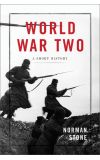
15 Feb 2013 04:06:58
The straight answer to both questions is no. Stone gives a superficial summary of the background and course of the war, raising endless questions and supplying few answers. The coming of war is down to Hitler "maddening everyone". Well, perhaps. But decades of scholarship have gone into trying to understand the international crises of the 1930s and the British and French decision for war. Perhaps historians have been wasting their time with tedious monographs and stolid research. No one reading Stone's brief account will be any the wiser.
There is no doubt that Stone's writing can at times be glibly clever; every now and again there is a flash of the AJP Taylor whom Stone so much admires (on 1940: "A Bismarck or a Churchill could control success of this order, a Hitler not").
He is sure that the decision to fight Hitler in 1939 and to carry on in 1940 was not rational, though less sure about why it happened; he joins the party which continues to argue that Normandy should have been invaded in 1943; he wisely recognises that both Hitler and Churchill were old-fashioned, rooted in 19th-century European fantasies about empire. His Churchill is, by the 1950s, "a mixture of mothballs and alcohol". But glibness will only get you so far. There is an extraordinary casualness about Stone's history that will leave most readers frustrated with its imprecisions and bland assumptions – dates are left out, names abandoned, policies reduced to a quick soundbite. The result amounts to a travesty of historical writing.
Consider this on the notorious "criminal orders" issued from Hitler's headquarters before the invasion of the Soviet Union. "Hitler expected to shut down the entire Soviet show," writes Stone, "and gave orders for all commissars and Jews to be executed on sight." This would at least solve the problem that has teased historians for decades about the "missing order" for the Holocaust, but it just will not do. There was no order to execute all Jews on sight, though Jews were indeed killed in large numbers. There is a vast and sophisticated literature on just this topic which Stone might well be advised to consider.
This is not mere nitpicking, though Stone leaves plenty of nits for the picking. Anyone who chooses this as their first book on the second world war by "one of Britain's greatest historians" (Penguin's words, on the cover) will be bombarded with errors and false statements. Take the chapter on the end of the war. Field Marshal Model did not move to the west to help save the German army at Arnhem, but had been masterminding the long retreat across France since August; the Waffen-SS was not the armed wing of the Nazi Party; the Potsdam raid of 14/15 April was not the last raid on Germany, there were 10 more, ending with Kiel on the 2/3 May; Mussolini apparently "died" at the end of April; and so on.
The last 20 or so years of history writing have transformed our understanding of the conflict, not only the details of its military course (which has profited from the availability of sources from the Soviet bloc and the widespread release of intelligence archives) but also the way in which societies were mobilised, the home front organised, cultures militarised, propaganda disseminated, science and technology adapted to crueller purposes. This war history has become the arena for asking important questions about what the war did to those who fought it – the ready embrace of atrocity, the behaviour of "ordinary men" in extraordinary circumstances, the exceptional courage of those who resisted or the civilians everywhere who were the victims of indiscriminate bombing.
Stone may be interested in all these things, but the book he has written tells us almost nothing about any of them. The rich literature on the war in all these many aspects perhaps makes it impossible any longer to write a comprehensive history. The only reason for cutting through it all and writing a short book might be to offer a fresh and challenging interpretation, a speculative essay to get us all thinking differently about the conflict. Alas, Stone has given us not so much an intellectual feast as a quick pub lunch.

